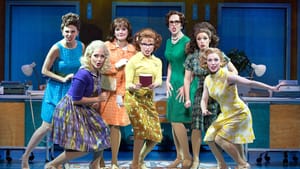Stay in the Loop
BSR publishes on a weekly schedule, with an email newsletter every Wednesday and Thursday morning. There’s no paywall, and subscribing is always free.
An American Everyman rising
'How to Succeed in Business' at the Walnut Street Theatre (2nd review)

Arthur Miller’s Death of a Salesman it was not. The opening night audience for How to Succeed in Business Without Really Trying — a wildly satirical musical and popular chestnut, performed at the Walnut Street Theatre — rooted for a little window washer. This male Cinderella wins the crown not with the help of a good fairy or a prince, but because of his wit, his charm, and his cunning way of manipulating people. We witnessed someone who won in the lottery of life, thanks to his innovative ways of deceiving others.
Even I, who considers the much-touted “American dream” an illusion, cheered on J. Pierrepont Finch, the lovable scoundrel, who managed to get a job in the mailroom of a large company and who moved all the way to the corporate top. I saw in him an American Everyman who firmly believes that every person who works hard can become a millionaire — except that the little Finch, from the very beginning, used one trick after another to win over backstabbing colleagues, conniving superiors, and insecure higher-ups in the hierarchy of the corporation.
On the way home, I asked myself why I would fall for this kind of a manipulative fairy tale. And then I remembered John Steinbeck’s sobering explanation for why socialism never really caught on in the United States: “The poor see themselves not as an exploited proletariat but as temporarily embarrassed millionaires.” And therein lies part of the secret of books and musicals like How to Succeed in Business Without Really Trying, especially during harsh economic times.
Auditions and director’s cut
The Walnut presented an entertaining show that also made one think. Casey Hushion’s direction hit hard with its many gentle, hilarious touches, and Michele Lynch’s choreography hit the floor and the audience with an energy that matched the story of the little window washer climbing the ladder of success.
I asked Hushion to share some of the secrets of successful casting: “In the audition process, we talked a lot about people who had the right chemistry and joy on stage, and a genuine love of musical comedy," she said. "You can’t fake that. That’s the intangible element that can make a production really lift off. We wanted people who could take a number like ‘Brotherhood’ and just make it explode with personality. We looked for eccentricity, too — actors with their own distinct looks and comic sensibilities so we could create our own quirky World Wide Wicket universe.”
Asked about how she coordinated these wildly talented cannonballs, Hushion revealed, “I had crazy looking notebooks full of little drawings that look like football plays about who could move what piece when. Luckily, Michele Lynch, the choreographer, and I are great friends. We have an awesome collaboration together, and we both adored this cast. They had incredible spirit, charm, humor, and positivity throughout the process. That made any challenge we faced surmountable."
Corporate servility, a choreographer’s cut
Michele Lynch’s finely tuned choreography brought out the sexism of the book by Abe Burrows, Jack Weinstock, and Willie Gilbert (based on the original best seller of the same name by Shepherd Mead), with lyrics and music by Frank Loesser.
Castigating the servility of employees who were expected to follow every command from above, Lynch literally had the dancers bend over, performing satirical-erotic rear-end movements. This wickedly creative absurdity made many of us laugh and become aware of how denigrating life in the corporate world can be, especially for women.
“On the surface, it's a man's world. However, the women in this show embody a subversive power: Rosemary, Hedy La Rue, Finch's mom, and Biggley's wife drive most of the decision making,” choreographer Lynch said, adding, “The glorious fashion of the time gave us great silhouettes for women.”
How to succeed with costumes, lights, scenic design, and music
Lisa Zinni’s zany costumes replicated the 1960s with her seductive outfits and over-the-top coiffures. The set design by Robert Andrew Kovach matched the intention of the musical perfectly, from the glass façade of a skyscraper and a hydraulic lift for the window washer all the way to the fancy, hilarious men’s room at a large corporation.
Paul Black’s lighting designs brought out intimate scenes with great effect, and Craig Beyrooti’s clear sound design made it unnecessary for anyone to borrow hearing aids. As in previous productions, the live orchestra, under award-winning music director Douglass G. Lutz, delivered a rich, top-rung quality sound.
Walnut cake productions: Great actors, great ensemble
Whoever discovered Jeremy Morse, the star of the show, hit a musical goldmine. Morse’s voice, his gestures, his charm, his agility, his split-second timing, and his impish good looks made him the finely carved figurehead on this corporate ship, bouncing up and down with the social waves.
The young hero who knows how to catch everyone’s attention and hook each higher-up into his net gets caught like an enthusiastic little goldfish by a lovelorn secretary (Becky Gulsvig), but he quickly learns to turn even these intimate circumstances into more dividends, yields, and rewards than he had ever imagined.
His enemy, the tall and snakelike Bud Frump, played by Brian Shepard with great conviction, looked like the descendant of the serpent in paradise. As a result of Frump’s double-tongued trickery, we liked the little Finch even more.
J. B. Biggley, the all-powerful company boss, looked and acted more presidential in parts than most corporate leaders. And his love interest, Hedy La Rue, a long-legged Barbie doll, played by Amy Bodnar, filled her role with erotic vigor, blending reality and fantasy that brought back the early days at Hugh Hefner’s Playboy Mansion in Chicago.
Two of Philadelphia’s singers with a heart and vocals that don’t need a microphone, Joilet Harris and Jeff Coon, added to the richness of the program, though I wanted to hear more of their stunning voices. As so often in Walnut cake productions, there are always cherries that have to wait for another musical torte.
What happens on Sunday, July 13, when the last curtain comes down for the little Finch, all the actors and dancers, even the director and choreographer, is another story. It’s almost always back to square one for everyone in the struggle toward success.
For another review, by Steve Cohen, click here.
What, When, Where
How To Succeed in Business Without Really Trying. Music and lyrics by Frank Loesser. Book by Abe Burrows, Jack Weinstock, and Willie Gilbert. Casey Hushion directed. Through July 13, 2014, at the Walnut Street Theatre, 825 Walnut Street, Philadelphia. 215-574-3550 or www.walnutstreettheatre.org.
Sign up for our newsletter
All of the week's new articles, all in one place. Sign up for the free weekly BSR newsletters, and don't miss a conversation.

 Henrik Eger
Henrik Eger